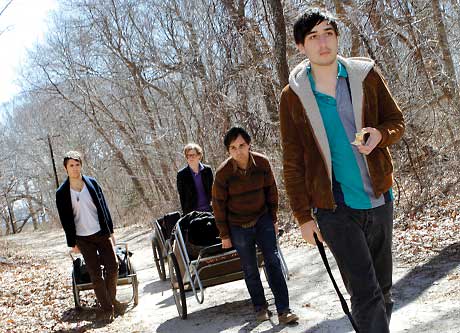It all started so simply. Edward Droste and a guitar made Horn of Plenty as an experiment to test his songwriting mettle. But, it led to interest and a demand for a live show. Thus, a band was needed. And what a band Droste got. Emboldened with more songwriters, Grizzly Bears second album, Yellow House, is a magical mystery tour of melody and catharsis. The band deny sounding like Animal Collective, and they dont in terms of out-there psychedelic yelps, but they are very similar in the department of sheer creativity and enthusiasm. The mind-altering "On a Neck, On a Spit starts out unassumingly, with Drostes plaintive vocals slightly layered on a background of banjos and a steady beat. When the song hits its climax, though, these layered howls and thundering drums, are unlike anything else. And really, this is why this album excels. Songs like "Knife, which turns pop structures upside down, "Little Brother, which psych-folks with the best of them, and the sublime "Reprise are all idiosyncratically wonderful and key word original. To give the highest praise, after the last chord is struck, all one really wants to do is listen to it again. And again. And again.
How was the experience recording this album different from your debut? Droste: Well, the thing a lot of people ask me, because it did start out as my own thing, is like, "Are you annoyed that youve relinquished control? Honestly, I would never want to make an album exactly like Horn of Plenty again. Im not really interested in doing the same thing every single time. Its so much more exciting to work with people who are challenging my ideas and Im challenging theirs, and you create something new that neither of you would have ever have done on your own. Thats much more interesting to me than me just sitting in my room and jerking off again.
Do you see the band as part of the psych-folk scene? I think theres this innate desire for everyone to envision a scene, which I dont really think actually exists, or if it does we just havent got our invitation yet. A lot of European journalists are like "Oh, you are part of the freak folk movement, but I dont know how that happened because weve never played a show with Devendra Banhart, CocoRosie or those people, and weve never collaborated with them. Maybe its just an acoustic guitar from Brooklyn equals freak folk.
(Warp)How was the experience recording this album different from your debut? Droste: Well, the thing a lot of people ask me, because it did start out as my own thing, is like, "Are you annoyed that youve relinquished control? Honestly, I would never want to make an album exactly like Horn of Plenty again. Im not really interested in doing the same thing every single time. Its so much more exciting to work with people who are challenging my ideas and Im challenging theirs, and you create something new that neither of you would have ever have done on your own. Thats much more interesting to me than me just sitting in my room and jerking off again.
Do you see the band as part of the psych-folk scene? I think theres this innate desire for everyone to envision a scene, which I dont really think actually exists, or if it does we just havent got our invitation yet. A lot of European journalists are like "Oh, you are part of the freak folk movement, but I dont know how that happened because weve never played a show with Devendra Banhart, CocoRosie or those people, and weve never collaborated with them. Maybe its just an acoustic guitar from Brooklyn equals freak folk.
